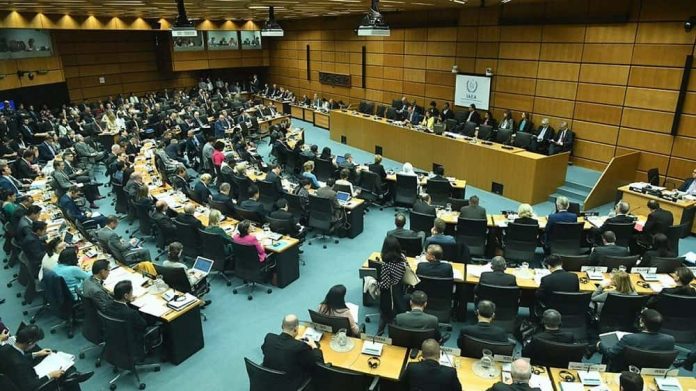Iran’s Nuclear Trajectory and the Failure of Diplomacy

iaea-board-of-governors-meeting-min
FILE PHOTO: IAEA Courtesy
Written by
Amir Taghati
On November 15, Reuters reported that Iran possesses enough uranium enriched up to 60% purity, nearing weapons-grade levels, for the production of three atomic bombs, according to the International Atomic Energy Agency’s definition. Iran continues to withhold critical information from the agency on key issues.
The stock of uranium enriched up to 60% has increased by 6.7 kg, reaching 128.3 kg since the last report on September 4, as indicated in one of the two reports seen by Reuters. This amount is over three times the approximately 42 kg, which, by the IAEA’s definition, is theoretically sufficient, if further enriched, to produce a nuclear bomb. This acceleration in uranium enrichment poses a grave threat to regional and global security.
The IAEA’s list of pressing issues with Iran has expanded, showcasing a lack of cooperation from the Iranian regime. Despite a March agreement to reinstall monitoring equipment, only partial compliance has been observed. Furthermore, the Iranian regime’s “de-designation” of highly experienced IAEA inspectors in September has raised concerns about the effectiveness of the agency’s verification activities. The lack of progress on these issues, as highlighted in the November reports, underscores the urgency for a more assertive international response.
Western powers, including the United States and its European allies, have exhibited hesitancy in confronting Iran’s nuclear ambitions. The fear of provoking a counter-reaction and the ongoing conflict in the region has hampered the enforcement of concrete measures against the Iranian regime. This appeasement policy, intended to avoid diplomatic escalation, has emboldened Tehran, allowing it to advance its nuclear program without facing severe consequences.
The regime’s nuclear dossier must be referred to the UN Security Council as soon as possible, and the six UNSC resolutions should be reinstated by the trigger mechanism, which should have been done a long time ago#Iran#JCPOA pic.twitter.com/9SK0sAe9LD
— Maryam Rajavi (@Maryam_Rajavi) September 14, 2022
Despite repeated warnings from the E3 (Britain, France, Germany) and the U.S. in September, the West has refrained from issuing formal condemnations or setting clear deadlines for Iran to comply with the IAEA investigation into Nuclear Non-Proliferation Treaty (NPT) violations. This lack of accountability raises concerns about Iran’s potential to develop nuclear weapons with impunity.
Rafael Grossi, the Director General of the IAEA, has emphasized the gravity of the situation. In an interview with the Financial Times, he underscored the risks associated with Iran’s nuclear activities. Grossi urged the international community not to lose sight of these risks amid other regional conflicts, highlighting the urgency of addressing Iran’s nuclear advancements.
Iranian regime’s consistent advancements in uranium enrichment, combined with the inadequacy of measures taken by the IAEA and Western powers, pose a significant obstacle to global endeavors aimed at curbing nuclear proliferation. The lingering question revolves around how the terrorist regime in Iran, persistently disregards and violates international agreements and commitments. The explanation can be traced back to the continuous adoption of appeasement policies by Western nations, characterized by repeated retreats from their proclaimed red lines and a failure to hold the Iranian regime accountable for its transgressions and atrocities.
Instead of immersing themselves in protracted nuclear negotiations, these nations should have reinstated the six UN Resolutions and activated the snapback mechanism outlined in UNSCR 2231. Such a decisive action would have thwarted the ambitions of the world’s most active state sponsor of global terrorism from acquiring the deadliest weapon of mass destruction.
The ongoing tragedies across the region and the persistent turmoil in the Middle East serve as poignant reminders that until decisive action is taken against the epicenter of extremism in Tehran, the region and the world will continue to grapple with a lack of peace and stability.

